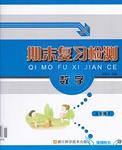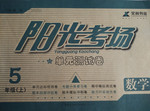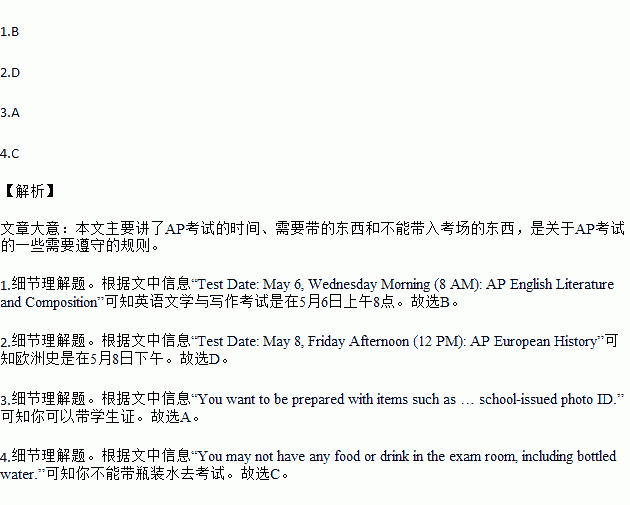题目内容
Taken each May by students all over the world, the AP Exam is the final step you take after a year of hard work in an AP class. These exams are designed to measure how well you’ve mastered the content and skills of the course — a successful score could even earn you credit in college.
Test Date: May 4, Monday
Morning (8 AM): AP Chemistry AP Environmental Science
Afternoon (12 PM): AP Psychology
Test Date: May 5, Tuesday
Morning (8 AM): AP Calculus AB AP Calculus BC
Afternoon (12 PM): AP Seminar AP Chinese Language and Culture
Test Date: May 6, Wednesday
Morning (8 AM): AP English Literature and Composition
Afternoon (12 PM): AP Japanese Language and Culture AP Physics 1: Algebra(代数)-Based
Test Date: May 7, Thursday
Morning (8 AM): AP Computer Science A AP Spanish Language and Culture
Afternoon (12 PM): AP Art History AP Physics 2: Algebra-Based
Test Date: May 8, Friday
Morning (8 AM): AP German Language and Culture AP United States History
Afternoon (12 PM): AP European History
What to Bring to the Exam Room
You want to be prepared with items such as No. 2 pencils for your multiple-choice answer sheet, black or dark blue pens for free-answer questions in most exams, and your government-issued or school-issued photo ID. A calculator is allowed on specified (指定的) exams.
What NOT to Bring to the Exam Room
You don’t want to bring any electronic equipment or communication devices, like cell phones, smart phones or anything else that can connect the Internet, any cameras or other photographic equipment, or even any watches that have an alarm. You may not have any food or drink in the exam room, including bottled water.
1.When is the test time for AP English Literature and Composition?
A.At 12 pm on Tuesday. B.At 8 am on May 6.
C.At 12 pm on Friday. D.At 8 am on May 7.
2.What exam can you take on the afternoon of May 8?
A.AP Art History. B.AP Environmental Science.
C.AP Computer Science A. D.AP European History.
3.What are you required to bring to the exam room?
A.Your school-issued photo ID. B.An electronic watch.
C.Your cell phone. D.Photographic equipment.
4.What are you NOT allowed to bring to the exam room in all AP exams?
A.No 2 pencils. B.Black pens. C.Bottled water. D.A calculator.
 期末复习检测系列答案
期末复习检测系列答案 超能学典单元期中期末专题冲刺100分系列答案
超能学典单元期中期末专题冲刺100分系列答案 黄冈360度定制密卷系列答案
黄冈360度定制密卷系列答案 阳光考场单元测试卷系列答案
阳光考场单元测试卷系列答案书面表达
前天,你所在的班级就学生的作业问题展开了一次讨论。以下是你班同学的观点:许多学生认为做作业很有好处,而部分学生不这样认为。请根据以下提示用英语写一篇简要的介绍,并表明你自己的观点。
许多学生 | 部分学生 | 你自己 |
1.帮助复习所学知识。 | 1.耗时太多,影响休息。 | …… |
2.帮助学生学会独立解决问题。 | 2.不能做他们喜欢做的事。 | |
3.完成作业是学生的职责,应该合理安排时间。 | 3.有些作业太难,无法完成。 |
注意:1. 短文须包括所有要点,但不要逐字翻译;可以适当增加情节,使内容连贯。
2. 词数90左右,短文的开头已为你写好,不计入总词数。
What do students think of their homework?
The day before yesterday, our class had a discussion about our homework. We have different ideas about homework.
.
.
.

